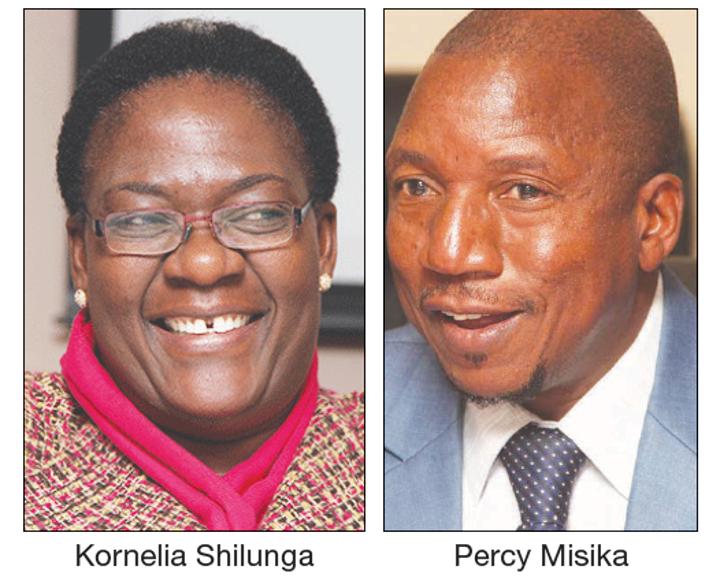Africa-Press – Namibia. DEPUTY minister of mines and energy Kornelia Shilunga and Ministry of Agriculture, Water and Land Reform executive director Percy Misika have emerged as beneficiaries of a government housing scheme, sparking questions about double-dipping.
Both appear on a list of 640 government officials earmarked to buy government houses on favourable terms. This comes after the treasury authorised the sale of 640 government houses countrywide.
The houses will be sold to current tenants at a collective price of more than N$230 million. Only nine of these houses will be sold in the Khomas region – at a combined price of N$8,8 million.
Shilunga and Misika are among the nine Khomas region beneficiaries. Both officials have denied being in the process of buying these houses, and could not explain how their names made it onto the list. DOUBLE-DIPPING CLAIMS
Questions have surfaced about their eligibility to be on the list, which is mainly aimed at benefiting junior government officials who do not receive a generous housing allowance from the government, unlike top officials.
Ministry of Works and Transport executive director Esther Kaapanda says Shilunga and Misika are neither jumping the queue nor receiving favourable treatment. She says according to policy, the houses are offered to live-in tenants.
“I do not have their payslips, so I cannot confirm if they were receiving a housing allowance, but they are not supposed to if they reside in government houses,” she says.
As a deputy minister Shilunga is entitled to a monthly housing allowance of N$13 268. She is earmarked to obtain a property of 1 330 square metres for N$1,8 million.
It is believed she has lived at the property since her appointment as deputy minister in 2015. “I am not aware of any plans to sell it, or of any offer to me to purchase it at whatever cost,” Shilunga said when contacted for comment.
She said she was not aware of the list on which her name appears, and added she was paying rent. “The rent is paid monthly as determined by the Ministry of Works and Transport – a direct deduction from my salary,” Shilunga said.
The deputy minister could not say how much she pays, and referred questions to the ministry’s salaries office, which she said would also confirm she was not receiving a housing allowance while occupying a government house.
Misika, as an executive director, receives a monthly housing allowance of N$8 535. He has been granted the right to buy a 1 448 square metre house at Olympia for N$1,8 million.
A source claims Misika has lived at the property since 2016 when he was appointed executive director, while still receiving his housing allowance. The rules do not allow for this.
Agriculture ministry spokesperson Jona Musheko says the executive director has an agreement with the ministry to pay rent. Musheko says Misika’s arrangement with the ministry involved that his rent was allowed to accumulate and would be deducted from his pension when he retires in December.
According to Musheko, Misika requests statements from the ministry’s human resources department on a yearly basis to keep track of how much he owes in rent.
Musheko says Misika will owe the government N$123 896 in accumulated rent for his stay in the house from December 2016 to November 2021. He says Misika’s rent was N$1 837 per month in December 2016 and has been increasing over the years. It currently stands at N$2 125 per month.
According to sources, the two officials do not qualify to be on the list if they receive monthly housing allowances from the government. The government’s policy on housing allowances states that a housing allowance will only be paid to an individual who does not receive a housing subsidy (for junior officials) and who is on management level at a ministry or government agency.
The individual must also not reside at official government accommodation, but instead rent a home (not government-owned), own a property, or have a bond on the said property.
Officials on foreign service or diplomatic missions are not allowed to rent their houses out while away if they want to continue receiving housing allowances. The housing allowance is discontinued once an official decides to rent out the house.
In the event of an official being promoted to a management position while occupying a government house, such official has three months to either buy the property or vacate it.
HOT WATER Occupying government-sponsored accommodation while still receiving a housing allowance has landed other senior officials in hot water before.
Former minister of defence and veterans affairs Penda ya Ndakolo had to repay his housing allowance of N$186 000 after it emerged the government spent more than N$630 000 on his accommodation at a Windhoek hotel for six months in 2015.
To avoid prosecution, Ya Ndakolo paid back the entire housing allowance. Others, such as former Swapo member of parliament Marina Kandumbu, were not as lucky.
Kandumbu was convicted of corruption in connection with renting out her government-subsidised house while living in a government house. Her conviction was handed down in November 2014, on the eve of her joining the parliament.
Kandumbu was sentenced to five years’ imprisonment or a fine of N$100 000. Four years of the jail term or N$90 000 of the fine was suspended, and she ended up paying a N$10 000 fine. In addition, she was ordered to repay the government the N$87 887 she scored from the housing scheme in 31 instalments.






